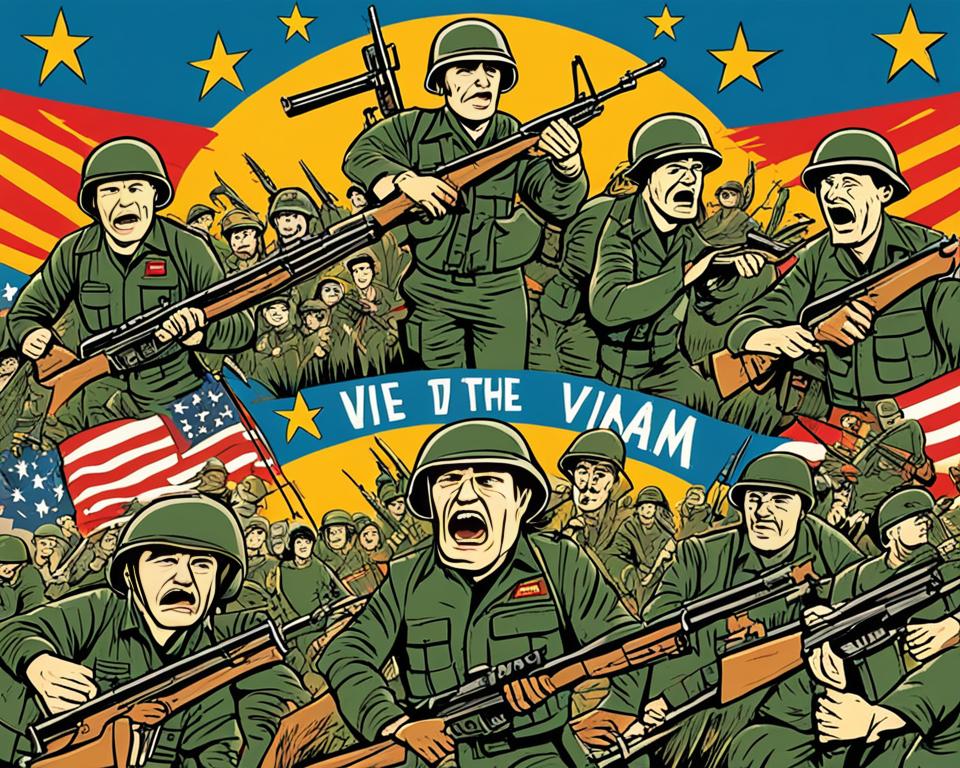Discover a curated list of powerful and impactful movies about the Vietnam War. These films provide a window into the realities and complexities of the conflict, showcasing the experiences of soldiers, the psychological toll of war, and the lasting effects on individuals and society. Whether you’re a history enthusiast or simply interested in thought-provoking cinema, these Vietnam War films offer a profound exploration of a pivotal period in American history.
Key Takeaways:
- Vietnam War films offer an authentic portrayal of the conflict and its aftermath, providing insights into the experiences of soldiers and the impact on society.
- Post-war films like “The Deer Hunter” and “Apocalypse Now” delve into the psychological impact of war on soldiers and the moral dilemmas they face.
- Some Vietnam War films reinforce stereotypes such as the “psycho vet” or the “wounded veteran,” while others portray soldiers finding purpose and redemption.
- Revenge fantasies, exemplified by films like “Rambo: First Blood Part II,” explore the idea of veterans seeking justice and closure.
- Powerful and impactful films like “Platoon,” “Full Metal Jacket,” and “The Deer Hunter” continue to resonate with audiences, capturing the complexities of war and its effects.
Table of Contents
Post-war Films
After the Vietnam War ended in 1975, a wave of American films emerged, depicting the conflict and its aftermath. These post-war films were characterized by their raw and realistic portrayals of battle, often incorporating actual footage from the war. Two notable examples of these iconic representations of the Vietnam War are “The Deer Hunter” and “Apocalypse Now”.
“The Deer Hunter” is a gripping drama that follows a group of friends from a small town in Pennsylvania who are profoundly impacted by the war. The film delves into their experiences during and after the conflict, exploring the psychological impact of war on soldiers and the moral ambiguities they face. It is known for its intense performances and powerful storytelling.
“Apocalypse Now” is a visually stunning and thought-provoking film directed by Francis Ford Coppola. It tells the story of a military captain who is sent on a mission to assassinate a renegade colonel during the war. The film explores the darkness of human nature and the surreal and absurd aspects of war. It is renowned for its mesmerizing cinematography and memorable performances.
Both “The Deer Hunter” and “Apocalypse Now” offer unique perspectives on the aftermath of the Vietnam War, shedding light on the psychological toll on soldiers and the challenges they faced upon returning home. These films continue to captivate audiences with their powerful storytelling and enduring relevance.
Stereotypes in Vietnam War Films
Vietnam War films often depicted various stereotypes, reflecting different aspects of the war and its aftermath. These stereotypes not only shaped the portrayal of characters but also influenced the audience’s perception of the war. Let’s explore some of the most notable stereotypes that emerged in Vietnam War films:
The Psycho Vet
One common stereotype was that of the “psycho vet,” portraying veterans as bloodthirsty psychopaths who wreaked havoc upon their return to the United States. These characters were often depicted as unstable and violent, driven to commit heinous acts due to their experiences in the war. While this stereotype provided dramatic tension in films, it perpetuated a negative image of the returning soldiers.
The Wounded Veteran
Another prevalent stereotype was that of the “wounded veteran,” portraying soldiers who were psychologically and physically traumatized by the war. These characters struggled with post-traumatic stress disorder (PTSD) and faced difficulties reintegrating into society. This stereotype highlighted the long-lasting impact of the war on individuals and served as a reminder of the hidden wounds that many veterans carried.
The Innocent
The “innocent” stereotype depicted young American men who, after surviving the war, transformed into “real men” with a newfound sense of maturity and purpose. These characters were often portrayed as naive individuals who experienced a loss of innocence due to the harsh realities of war. Their transformation showcased the profound impact the war had on their lives and challenged societal perceptions of masculinity.
The Warrior
Lastly, the stereotype of the “warrior” portrayed soldiers who found purpose and redemption in the Vietnam War. These characters embraced the chaotic and brutal nature of the conflict, using their military training to excel in combat. The warrior stereotype highlighted the resilience and bravery of soldiers while disregarding the complex realities of war, such as the moral ambiguities and personal sacrifices made.
Vietnam War films played a significant role in shaping these stereotypes, often perpetuating simplistic and narrow representations of veterans. While these characters may have served as compelling narratives within the context of the films, it is essential to recognize that they do not reflect the full spectrum of experiences and emotions endured by those who served in Vietnam.
Revenge Fantasies in Vietnam War Films
In the 1980s, a popular genre of Vietnam War films emerged, known as revenge fantasies. These films captured the imagination of audiences by depicting Vietnam veterans seeking vengeance by returning to Vietnam and triumphing over their enemies. One notable example of a revenge fantasy film is “Rambo: First Blood Part II,” featuring the iconic character John Rambo.
In “Rambo: First Blood Part II,” John Rambo, played by Sylvester Stallone, becomes a one-man army as he takes on both Vietnamese and Soviet forces. The film portrays Rambo as a fearless and unstoppable warrior who fights to rescue American prisoners of war and avenge the betrayal he experienced during his service in Vietnam.
Revenge fantasies in Vietnam War films often depicted the war as a conflict that could have been won if not for political betrayal. These films resonated with audiences who sought empowerment and a sense of justice. The popularity of revenge fantasies reflected a desire to rewrite history and provide a cathartic release for the emotions surrounding the Vietnam War.
Powerful and Impactful Films
Several films about the Vietnam War have stood the test of time and continue to resonate with audiences due to their powerful and impactful storytelling. Among these iconic films are “Platoon,” “Full Metal Jacket,” and “The Deer Hunter.”
“Platoon” delves into the moral and psychological struggles faced by soldiers on the ground. The film portrays the harsh realities of war, highlighting the tension and conflicts within a platoon stationed in Vietnam. Through its intense and realistic portrayal, “Platoon” captures the raw emotions and devastating consequences of combat.
“Full Metal Jacket” examines the dehumanizing effects of war during both training and combat. The film focuses on the transformation of a group of recruits as they undergo brutal military training and subsequently face the horrors of the Vietnam War. Through its distinctive two-part structure, “Full Metal Jacket” explores the psychological impact of war on individuals and the erosion of their humanity.
“The Deer Hunter” tells the story of a group of friends from Western Pennsylvania whose lives are profoundly affected by the war. The film explores themes of friendship, sacrifice, and the devastating impact of war on the human psyche. Through its powerful narrative and emotionally charged performances, “The Deer Hunter” offers a poignant reflection on the Vietnam War and its lasting effects.
| Film | Director | Year |
|---|---|---|
| Platoon | Oliver Stone | 1986 |
| Full Metal Jacket | Stanley Kubrick | 1987 |
| The Deer Hunter | Michael Cimino | 1978 |
Lesser-known Films and Hidden Gems
In addition to the well-known and critically acclaimed films about the Vietnam War, there are also lesser-known films and hidden gems that provide unique perspectives on the conflict. These films may not have gained the same level of recognition but are still worthy of exploration. Discovering these lesser-known films allows viewers to delve deeper into the complexities of the war and gain new insights.
One such hidden gem is “Casualties of War,” directed by Brian De Palma. Released in 1989, this film tells the gripping story of a group of American soldiers who commit a horrific act during the war. It shines a light on the devastating moral dilemmas faced by soldiers in the heat of battle.
“Rescue Dawn,” directed by Werner Herzog in 2006, is another lesser-known film worth mentioning. Starring Christian Bale, it is based on the true story of a U.S. Navy pilot who is captured and imprisoned during the Vietnam War. This gripping tale of survival and resilience showcases the indomitable spirit of the human soul.
Another hidden gem is “Hamburger Hill,” directed by John Irvin. Released in 1987, this film depicts the fierce and bloody battle for Hill 937 during the Vietnam War. It offers an unflinching look at the realities of war and the sacrifices made by the soldiers.
Exploring these lesser-known films allows viewers to discover hidden perspectives, untold stories, and nuanced portrayals of the Vietnam War. They provide a counterbalance to the more mainstream narratives and offer a deeper understanding of the complexities of the conflict.
| Film | Director | Release Year |
|---|---|---|
| Casualties of War | Brian De Palma | 1989 |
| Rescue Dawn | Werner Herzog | 2006 |
| Hamburger Hill | John Irvin | 1987 |
Conclusion
The Vietnam War holds a significant place in American history, and films about this conflict continue to provide profound and thought-provoking reflections on its impact. These movies offer realistic portrayals of combat and delve into the psychological toll on soldiers, allowing audiences to gain a deeper understanding of the experiences of those who fought in Vietnam.
Whether it’s the iconic classics like “The Deer Hunter” and “Apocalypse Now” or lesser-known gems like “Casualties of War” and “Rescue Dawn,” Vietnam War films serve as a window into the past. They offer a means of connecting with the history, struggles, and sacrifices of those involved in the war.
Through cinema, we can explore the complexities of war, the moral dilemmas faced by soldiers, and the long-lasting effects on individuals and societies. Movies about Vietnam not only entertain but also educate and inspire discussions about the human cost of war and the importance of promoting peace.


